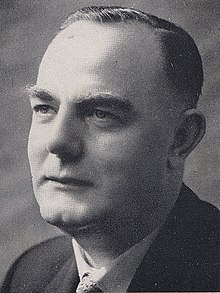John Vorster
Appearance

Balthazar Johannes "B. J." Vorster (13 December 1915 – 10 September 1983), served as the Prime Minister of South Africa from 1966 to 1978 and as the 4th State President of South Africa from 1978 to 1979. Vorster was known for his staunch adherence to apartheid. While serving as Minister of Justice he oversaw the Rivonia Trial in which Nelson Mandela was sentenced to life imprisonment for sabotage.
Quotes
[edit]- ...the policy of separate development can be tested by any unprejudiced person against the requirements of Christianity and morality, and it will be found to meet all those requirements. ... for conditions such as those in South Africa there is no other policy[, for without it] you will have chaos and ultimately bring about the downfall of all population groups here in South Africa. South Africa's problems are unique and South Africa has chosen its solution. ...we, the Whites, the Coloureds, the Asians and the Bantu, will work out our own solutions here in South Africa. ...we instituted the policy of separate development, not because we considered ourselves better than others, not because we considered ourselves richer or more educated than others. We instituted the policy of separate development because we said we were different from others. We prize that otherness and are not prepared to relinquish it. ... We have our land and we and we alone will have authority over it. We have our Parliament and in that Parliament we and we alone will be represented; that is why [during] this past session it was my pleasant privilege to ... abolish Coloured representation in Parliament; and it has been abolished once and for all. ... but one should also put something in its place. That is why the National Party ... for the first time [has given] the Coloureds in the Republic a Coloured Persons Representative Council in their own political area [where they] can exercise their political rights in their own way and by their own people. That is morality, that is policy, that is standpoint. ... We said you may not attend my university, but we did not leave it at that. We said we shall give you a university of your own. We said you may not attend my school but we said we shall give you a school of your own. That is morality, that is Christianity ...
- John Vorster in his Heilbron speech on 16 August 1968, as quoted in sahistory.org.za
- The government will not be intimidated. Orders have been given to maintain order at all costs.
- On 18 June 1976 to parliament after the Soweto riots, as quoted in Down with Afrikaans - Oakes, D. (ed.), 1988. Illustrated history of South Africa – The real story, Reader’s Digest: Cape Town, sahistory.org.za
Quotes about Vorster
[edit]- The Verwoerds, Vorsters and those many others within the Broederbond-dominated hierarchy of the National Party have done incalculable harm to South Africa in sport, not to mention every other field of human endeavour or relations.
- Tommy Bedford in the run-up to the 1987 election, as quoted by Douglas Booth in The Race Game: Sport and Politics in South Africa, Frank Cass, p. 141
- Uri Friedman: Why did the South African government, in the mid-1970s, decide to embark on a nuclear-weapons program?
- F.W. de Klerk: The main motivation was the expansionist policies of the U.S.S.R. in southern Africa. They were supporting all the [African] liberation movements—they were supplying weapons and training—and it was part of their vision to gain direct or indirect control over most of the countries in southern Africa. They financed the deployment of many thousands of Cuban troops, especially to Angola, and this was interpreted as a threat first by Prime Minister John Vorster, and following upon him P.W. Botha. [The nuclear arsenal] was never intended, I think, to be used. It was a deterrent. Because of apartheid South Africa was becoming more and more isolated in the eyes of the rest of the world. There wouldn’t be, in the case of Russian aggression or invasion, assistance from the international community. It was felt that, if we have nuclear weapons, and if we then would disclose in a crisis that we have [them], it would change the political scenario and the U.S.A. and other [Western] countries might step in and assist South Africa.
- F. W. de Klerk as interviewed by Uri Friedman, "Why One President Gave Up His Country's Nukes". The Atlantic, (9 September 2017).

